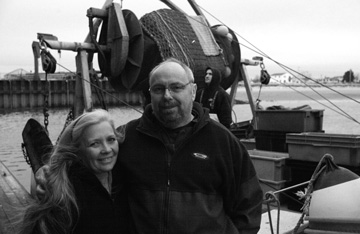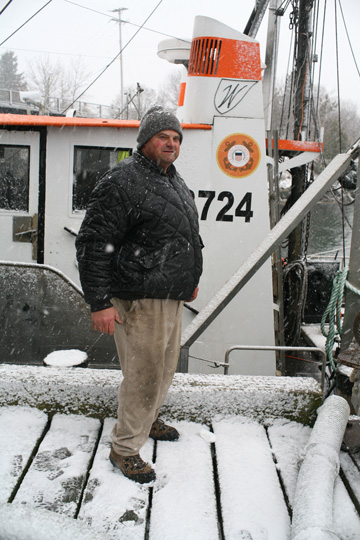Fishermen On Fishing.....

Dave and Ellen Goethel aboard their 44' fishing vessel in Hampton Harbor, NH. Dave is a life long fisherman, marine biologist, and two term NEFMC council member. ©Photo by Sam Murfitt
Dave Goethel has been fishing since he was 13 years old. He started as a mate on a party boat, paying his way through college with that work. Dave graduated cum laude from Boston University with a degree in biology. He was a published research biologist at the New England Aquarium when he decided to go back to fishing. He and his wife Ellen got the party boat back in the water. In 1983 he bought a dragger and has been fishing full time since, 180 days a year, currently from a 44' Stanley.
Dave has always been active in fisheries management issues. He is in his second term, his sixth year, as a New England Fisheries Management Council member, which represents 41 day long meetings between Provi- dence, RI and Portland, ME. In addition, he has attended countless state and other fisheries meetings regularly over the years.
As a council member he is well versed in the fisheries management process. About the upcoming implementation of national policy he said, “It is not changing for the better.
Special interests have been driving it, led by NOAA and include several others. These policies will fail. They are bad for fish, they are bad for fishermen, and they will destroy infrastructure.”
The agenda of the special interests has been to drive down the number of boats. They believe capital markets will do this through the sale of catch share quotas. However, Goethel believes the corporate survivors will target the biggest fish in a way that’s never been done before, rapidly eliminating the stock rebuilding gains made over the last 20 years.
Goethel went to New Zealand with a group of scientists and fishermen in 2007 to observe fisheries. An individual transferable quota (ITQ) system had been instituted there and rapid corporate consolidation followed.
“Multi-national corporations influenced the debt loads of small boat fishermen there, forcing them out, and ultimately buying their quota. Corporations own 90 percent of the quota for all of New Zealand. Just six corporations own 30 percent of the third largest Economic Zone in the world.”
Councilman David Pierce read into the council in January 2010 record that in recent months 8 percent of the boats already own 50 percent of the quota. This new ownership of the commons has unfolded in the months since sectors with quota seemed the likely management structure to be put in place.

Andy Lang, Portsmouth harbor, New Hampshire, February 2010. ©Photo by Sam Murfitt
“This is the downfall of the whole program. This regulatory plan is more along the lines of, the only way you get ahead is to let them to say well, this is the way it's going to be. To me this is immoral, and a violation of our human rights. We have human rights, we have our children, we have educated our children, we have huge mortgages on our boats and our homes, and lot of guys are going to lose everything. Thank God that I can work in our family business, a nursery business, in the winter as I have all of my life.
I dove for scallops, I dove for sea urchins, I shrimped. I have always done 3,4,5 months of fishing and if not involved in it year round I’ve owned a boat and my son has fished. My son, ever since he’s been able to come aboard a ship with a little life preserver, he’s been on the water. He is 28. He’s a commercial fisherman, he bought a permit, he has one permit, one boat. He has a baby, a wife, he is working hard. And here it is, he’s an active fisherman, and can prove it tax-wise, and then to be left out of the ground fisheries, when he’s been fishing so long.
What I think is really, really important here is that the people who have worked with the program, people who didn’t stack the permits, the people who worked with it, and made it happen. It’s these people who didn’t fish who are responsible for the rebuilding program here in New England.
That’s what is really important, the people who didn’t fish, that went on to different fisheries and multi species, these are the people that should be rewarded. But they are not being rewarded. and that is the problem with this whole situation.
Andy Lang
Portsmouth, NH
